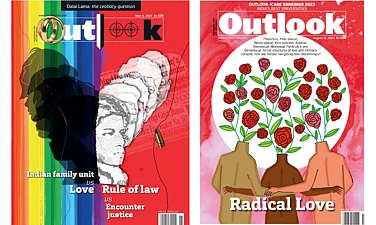A cameo artiste who looks good against the backdrop of a bungling central government? Or a high-vol-tage performer who meets the electorate's expectations? Either way you see it, Delhi chief minister Sheila Dikshit has achieved the distinction of being more popular at the end of her five-year term than she was at the beginning. Political pundits see it as that rare instance of incumbency working as an advantage to a politician rather than against.
In Delhi, what appears a 'positive incumbency factor' is actually performance-linked, say poll-watchers. "It's not that incumbency works for the government irrespective of what it does. Simply put, the voters' mood reflects your work," maintains Yogendra Yadav of the Centre for the Study of Developing Societies (CSDS) which has done an extensive opinion poll on Delhi. In Dikshit's case, says CSDS' D.L. Sheth, both her own accomplishments and cumulative disgust with the Centre's ineptitude on various fronts—law and order, the economy, unemployment—have shaped voters' perceptions. "Anti-incumbency is a euphemism for non-performance. And people feel she has performed," he adds.
Positive incumbency may have given the Congress an edge in the assembly polls, but victory is by no means assured. Delhi's citizens may prefer the no-nonsense competence of Dikshit to the fuzzy appeal of her BJP rival Madan Lal Khurana, but ironically, many of her own MLAs don't quite share in that approval. The party's under-achievers are relying on the Dikshit government's equity with voters, which may not be enough to hide their poor showing.
Dikshit has built up this equity without Chandrababu-style freebies or a Jyotibabu-style lean and mean party machine. She didn't get much help from babus of the bureaucratic kind either. The odds were stacked against Dikshit, with virtually her entire party trying to pull her down and the central government, in the shape of Vijai Kapoor, the BJP-appointed lieutenant-governor, always there to breathe down her neck. The police isn't under the Delhi government's purview and the municipal corporation is pretty much autonomous. So, Dikshit's pitch to voters is that even with one hand figuratively tied behind her back, she's trying to deliver a better tomorrow. That she's their best hope for motorable roads, regular power and clean air.
There's a general feeling among many of Delhi's influential network of residents' welfare associations (RWAs) that civic services, with the exception of water supply, have improved. Dikshit's much-hyped Bhagidari scheme, which brings citizens' associations face-to-face with government officials, has drawn approval from even deputy prime minister L.K. Advani. While the scheme may not have delivered anything concrete, it has contributed to an impression of a government that seems to want to work. For instance, south Delhi RWAs said their concerted opposition couldn't stop the mcd from ruining hundreds of parks with monstrous fountains which only spouted air, not water. But at least they had a forum for protest. So, bureaucracy is accessible, if not accountable.
How much is hype and how much is substance? 'Deconstructing' positive incumbency, Dikshit's apparent success is an optical illusion, feels JNU professor Dipankar Gupta. But one the voters seem to have accepted as reality. "The anti-incumbency against the central government is so huge it eclipses everything else," he says. Against the backdrop of the BJP's gross mismanagement, Dikshit's own errors are lost.
Delhi BJP vice-president Vijay Jolly says Dikshit's good governance is all about appropriating credit. "She has spent crores on building herself up and taking credit for schemes like flyovers, which were initiated by the previous BJP government. She's even preening over the Delhi Metro, which is a central government project".Media perception is pro-Dikshit to the extent of being one-sided, says Jolly. Privatisation of power is being touted as a success but the fact that it's resulted in ruthless exploitation of slum-dwellers by private contractors is lost, he points out.
But CSDS's Sheth believes Delhi voters aren't that easily fooled: "They see governance as it comes through the door." Unlike their counterparts in other states, Delhi's 70 MLAs don't quite enjoy the luxury of distance; they live right down the road from their constituents and endure year-round scrutiny. The Delhi voter is highly individuated rather than group-oriented, making it harder for public representatives to get away with non-performance, he adds.
In terms of image, both Dikshit and Khurana have a relatively clean track record and command considerable goodwill among Delhiites. Dikshit's usp is that despite her grandmotherly appearance, she comes across as a 21st century "boardroom" CM. That is definitely one factor contributing to positive incumbency.
While psephologists claim that she will return for a second term, the final outcome will be a test for Dikshit and Delhi's voters.
Pro-Incumbency Factor
Dikshit ends her tenure with a bang. Can she pull along her MLAs for another go?

Pro-Incumbency Factor
Pro-Incumbency Factor
Published At:
- Previous Story
 Beyond Family, Caste And Consent: What The Delhi High Court’s Ruling Signals
Beyond Family, Caste And Consent: What The Delhi High Court’s Ruling Signals - Next Story
MOST POPULAR
WATCH
MORE FROM THE AUTHOR
PHOTOS
×





















